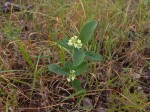| Home | > | List of families | > | Rubiaceae | > | Psychotria | > | spithamea |
Psychotria spithamea
Selected images: Click on each image to see a larger version and details of the record View all images (2)
Detailed records: Display species records QDS maps by: Google Maps Point records by Google Maps
Species details: Click on each item to see an explanation of that item (Note: opens a new window)
| Synonyms: | |
| Common names: | |
| Frequency: | |
| Status: | |
| Description: |
Subshrub with several stems 10–50 cm. tall from a mostly creeping woody rhizome; stems usually only leafy at the upper nodes, glabrous to densely pubescent, often becoming covered with soft corky bark. Leaf blades 3–22 x 0.6–5.4 cm., narrowly elliptic to elliptic but variable and sometimes obovate, elliptic-ovate or linear-oblong, rounded to acute at the apex, narrowly cuneate at the base, glabrous to pubescent above and beneath, mostly distinctly paler beneath and sometimes whitish; domatia absent; nodules mostly numerous, scattered in the lamina and often not easy to see; petiole 0.3–2 cm. long, glabrous or pubescent; stipules 3–8 mm. long, ovate-triangular, entire at the apex or bifid for almost 1 mm., either thin and soon deciduous or thick and woody and ± persistent. Flowers heterostylous, 5-merous, in usually ± dense slightly branched inflorescences 1.5–5 cm. long; peduncle 0.5–3 cm. long, pubescent or glabrescent often bent ± at right angles; secondary branches 0.3–1.3 cm. long, similarly hairy; pedicels 1–2 mm. long, attaining 5 mm. in fruit, glabrous or pubescent; bracts small, filiform, ± 3 mm. long. Calyx tube ± 1 mm. long, subglobose, glabrous or pubescent; limb 0.75–1.5 mm. tall, cupuliform, usually glabrous, more rarely densely hairy; lobes unequal, 1–2 mm. long, mostly triangular-lanceolate, usually ± ciliate on the margins, or rarely lobes obsolete.Corolla white or cream, glabrous outside; tube 3–5 mm. long; lobes 2.5–3.5 x 0.8 mm., narrowly oblong. Drupes red, 3.5–6 x 7–10 mm., didymously biglobose, glabrous or pubescent, sometimes with only 1 pyrene due to abortion; pyrenes 5 x 4 x 4 mm. subglobose. Seeds subglobose, ventral surface with a deep Y- or V-shaped fissure and, save for the area of the junction of the 2 pyrenes, having a spherical air space between the hard outer layers and the albumen, which is not otherwise ruminate. |
| Type location: |
Zambia |
| Notes: | |
| Derivation of specific name: | spithamea: a span, long or high |
| Habitat: | |
| Altitude range: (metres) | |
| Flowering time: | Nov - Jan |
| Worldwide distribution: | Angola through DRC (Katanga), Burundi and Tanzania south to Zambia, Malawi and Mozambique |
| National distribution: | |
| Growth form(s): | Shrub under 2 m. |
| Endemic status: | |
| Red data list status: | |
| Insects associated with this species: | |
| Spot characters: | Display spot characters for this species |
| Literature: |
Burrows, J.E. & Willis, C.K. (eds) (2005). Plants of the Nyika Plateau Southern African Botanical Diversity Network Report No. 31 SABONET, Pretoria Page 251. (Includes a picture). Verdcourt, B. (1988). Rubiaceae, Part 1 Flora Zambesiaca 5(1) Pages 30 - 31. |
Other sources of information about Psychotria spithamea:
Our websites:
Flora of Malawi: Psychotria spithameaFlora of Mozambique: Psychotria spithamea
Flora of Zambia: Psychotria spithamea
External websites:
African Plants: A Photo Guide (Senckenberg): Psychotria spithameaAfrican Plant Database: Psychotria spithamea
BHL (Biodiversity Heritage Library): Psychotria spithamea
EOL (Encyclopedia of Life): Psychotria spithamea
GBIF (Global Biodiversity Information Facility): Psychotria spithamea
Google: Web - Images - Scholar
iNaturalist: Psychotria spithamea
IPNI (International Plant Names Index): Psychotria spithamea
JSTOR Plant Science: Psychotria spithamea
Mansfeld World Database of Agricultural and Horticultural Crops: Psychotria spithamea
Plants of the World Online: Psychotria spithamea
Tropicos: Psychotria spithamea
Wikipedia: Psychotria spithamea
| Home | > | List of families | > | Rubiaceae | > | Psychotria | > | spithamea |

